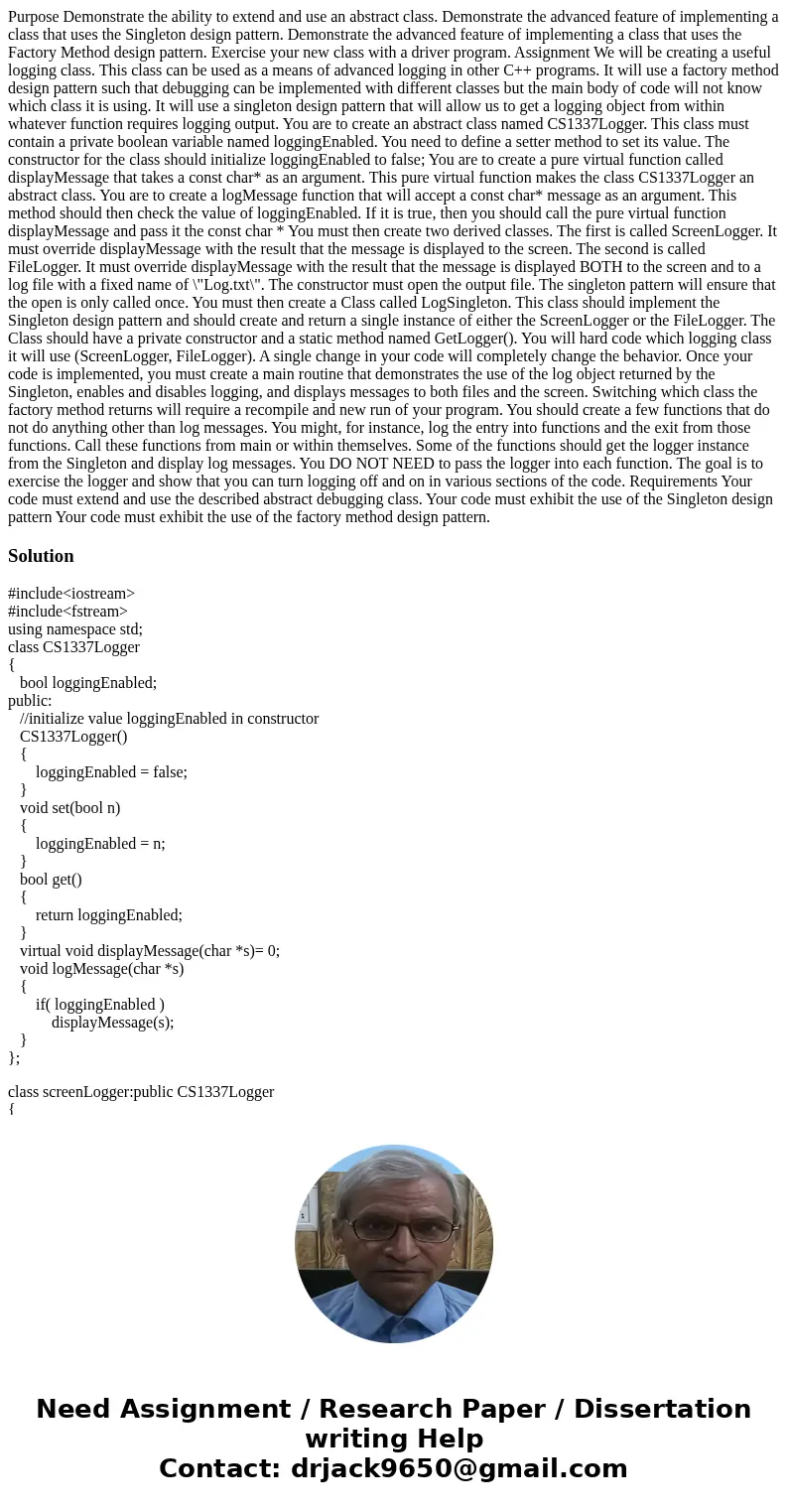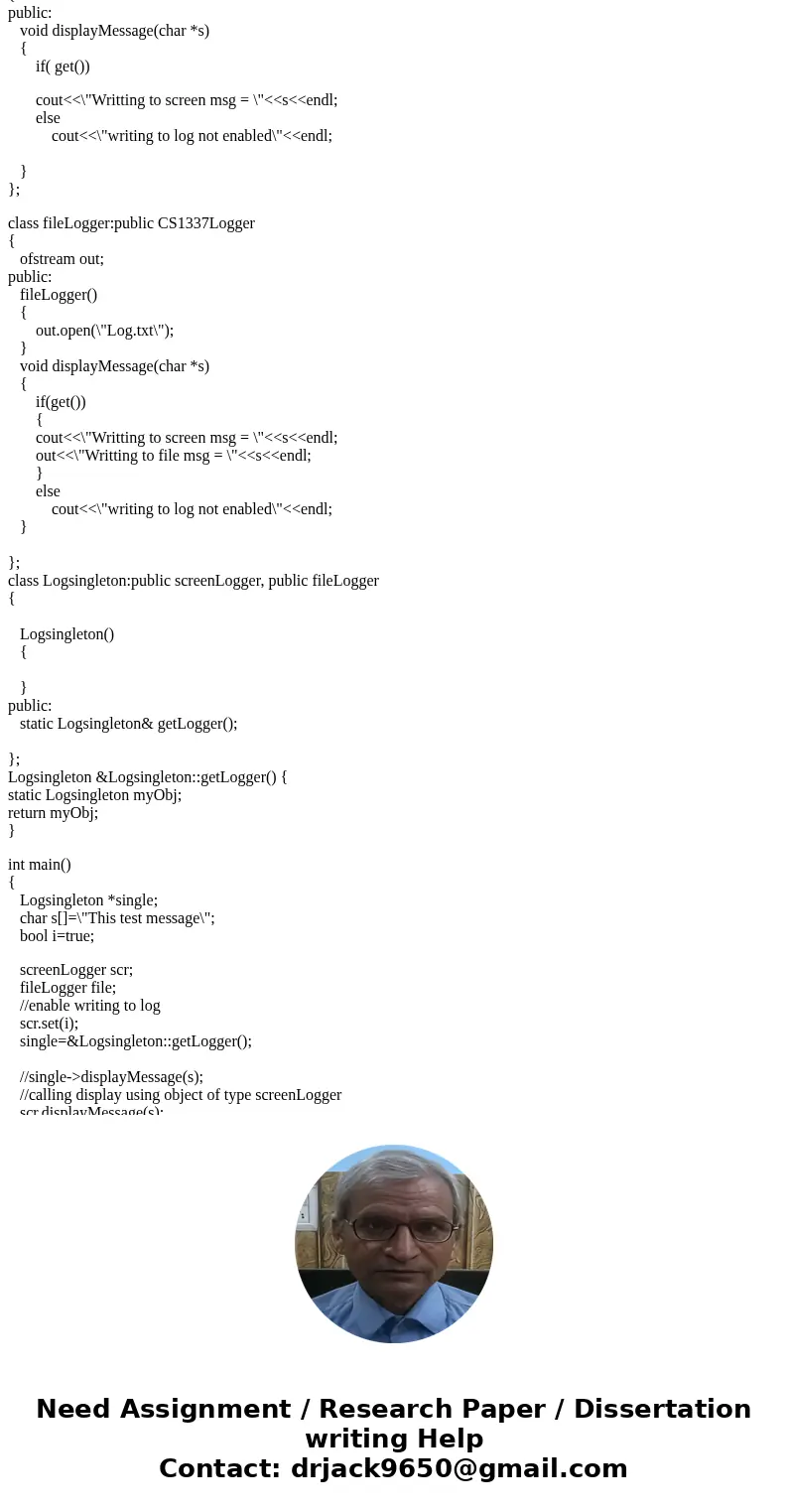Purpose Demonstrate the ability to extend and use an abstract class. Demonstrate the advanced feature of implementing a class that uses the Singleton design pattern. Demonstrate the advanced feature of implementing a class that uses the Factory Method design pattern. Exercise your new class with a driver program. Assignment We will be creating a useful logging class. This class can be used as a means of advanced logging in other C++ programs. It will use a factory method design pattern such that debugging can be implemented with different classes but the main body of code will not know which class it is using. It will use a singleton design pattern that will allow us to get a logging object from within whatever function requires logging output. You are to create an abstract class named CS1337Logger. This class must contain a private boolean variable named loggingEnabled. You need to define a setter method to set its value. The constructor for the class should initialize loggingEnabled to false; You are to create a pure virtual function called displayMessage that takes a const char* as an argument. This pure virtual function makes the class CS1337Logger an abstract class. You are to create a logMessage function that will accept a const char* message as an argument. This method should then check the value of loggingEnabled. If it is true, then you should call the pure virtual function displayMessage and pass it the const char * You must then create two derived classes. The first is called ScreenLogger. It must override displayMessage with the result that the message is displayed to the screen. The second is called FileLogger. It must override displayMessage with the result that the message is displayed BOTH to the screen and to a log file with a fixed name of \"Log.txt\". The constructor must open the output file. The singleton pattern will ensure that the open is only called once. You must then create a Class called LogSingleton. This class should implement the Singleton design pattern and should create and return a single instance of either the ScreenLogger or the FileLogger. The Class should have a private constructor and a static method named GetLogger(). You will hard code which logging class it will use (ScreenLogger, FileLogger). A single change in your code will completely change the behavior. Once your code is implemented, you must create a main routine that demonstrates the use of the log object returned by the Singleton, enables and disables logging, and displays messages to both files and the screen. Switching which class the factory method returns will require a recompile and new run of your program. You should create a few functions that do not do anything other than log messages. You might, for instance, log the entry into functions and the exit from those functions. Call these functions from main or within themselves. Some of the functions should get the logger instance from the Singleton and display log messages. You DO NOT NEED to pass the logger into each function. The goal is to exercise the logger and show that you can turn logging off and on in various sections of the code. Requirements Your code must extend and use the described abstract debugging class. Your code must exhibit the use of the Singleton design pattern Your code must exhibit the use of the factory method design pattern.
#include<iostream>
#include<fstream>
using namespace std;
class CS1337Logger
{
bool loggingEnabled;
public:
//initialize value loggingEnabled in constructor
CS1337Logger()
{
loggingEnabled = false;
}
void set(bool n)
{
loggingEnabled = n;
}
bool get()
{
return loggingEnabled;
}
virtual void displayMessage(char *s)= 0;
void logMessage(char *s)
{
if( loggingEnabled )
displayMessage(s);
}
};
class screenLogger:public CS1337Logger
{
public:
void displayMessage(char *s)
{
if( get())
cout<<\"Writting to screen msg = \"<<s<<endl;
else
cout<<\"writing to log not enabled\"<<endl;
}
};
class fileLogger:public CS1337Logger
{
ofstream out;
public:
fileLogger()
{
out.open(\"Log.txt\");
}
void displayMessage(char *s)
{
if(get())
{
cout<<\"Writting to screen msg = \"<<s<<endl;
out<<\"Writting to file msg = \"<<s<<endl;
}
else
cout<<\"writing to log not enabled\"<<endl;
}
};
class Logsingleton:public screenLogger, public fileLogger
{
Logsingleton()
{
}
public:
static Logsingleton& getLogger();
};
Logsingleton &Logsingleton::getLogger() {
static Logsingleton myObj;
return myObj;
}
int main()
{
Logsingleton *single;
char s[]=\"This test message\";
bool i=true;
screenLogger scr;
fileLogger file;
//enable writing to log
scr.set(i);
single=&Logsingleton::getLogger();
//single->displayMessage(s);
//calling display using object of type screenLogger
scr.displayMessage(s);
//calling display using object of type fileLogger
file.set(i);
file.displayMessage(s);
//disable writing to log
i = false;
scr.set(i);
//calling display using object of type screenLogger
scr.displayMessage(s);
//calling display using object of type fileLogger
file.displayMessage(s);
}



 Homework Sourse
Homework Sourse